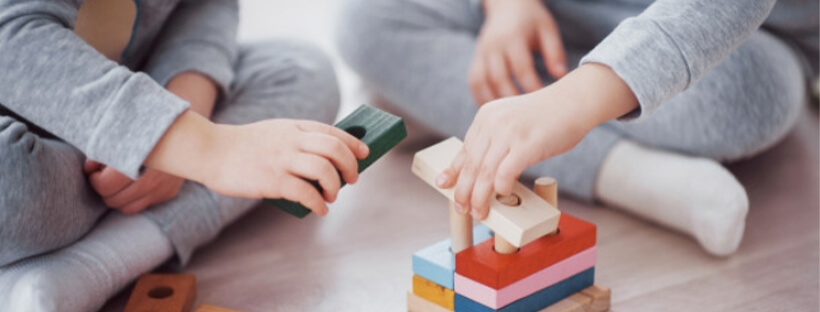Significance of unstructured play in kids
 17147
17147

super easy
“Play is a kid’s first occupation.” In today’s culture, parents’ quest to pave their child’s path to success often makes them schedule their day from beginning to end. Doing so, they end up filling their children’s days with activities that they believe are fundamental to accomplishing that objective. In rare moments, play owns a place in that rundown of significant activities, that too, a structured play that is not as productive as its counterpart. If you’re wondering what this structured play is and what’s its counterpart, don’t worry. Play is usually classified into two categories that are given below:
1. Structured play
Any game that is incited or directed by someone else than the child, in general, falls in the category of a structured play. In this, the child is supposed to abide by certain fixed guidelines to reach an end, starting from a fixed beginning. That is, there is a fixed “structure” to be followed. Although it’s beneficial for the overall development of your kid, it does not develop creativity among them as they are made to follow a predefined structure.
2. Unstructured play
Contrary, any game that has no fixed beginning or/and end and depends solely on the player’s imagination and creativity gets under the category of unstructured play. This type of play is not rules oriented and is personal to the children. Hence, unstructured play is what you all must cultivate among your kids in order to achieve its following benefits.
Benefits of an unstructured play for kids
1. Unstructured play develops social skills among the kids.
Play is the best way for your kid’s all-round development. Through play, kids grow physically, mentally, emotionally, and socially. When engaged in any kind of unstructured play, they figure out how to cooperate and communicate with each other. More elevated social abilities like kinship, teamwork, and coordination are likewise promoted as kids develop. Guardians, too, as their part, can contribute towards their kid’s social development apart from the unstructured play. This includes teaching fairness in play, encouraging their small triumphs, coordinating with the kids as they require, etc.
2. It helps creativity grow.
“Kids are creative by birth.” When children engage themselves in a free (or unstructured) play, they tap into imaginative thinking. For example, in LEGO, kids follow the given instruction manual to assemble the blocks. However, if they use their creativity to form different structures as per their imagination, it’ll be far better than before. Thus, the unstructured play offers unlimited open doors for investigating how to utilize a wide range of materials to create something unique like never before. At the point when youngsters have a satisfactory chance to play on their own terms, they learn & develop at their own pace and assemble sensibility and ability simultaneously.
Tips for the Guilty Working Parent
It is essential to understand that children only need ‘good enough’ and ‘happy’ parents and not parents who hover around them all the time. Ensure to come up with rituals or home routines that you will prioritize at any cost. Select your priorities with the school your child attends. Do ensure to make time to relax and play as a family. Ensure to schedule time during the weekends to keep up with the assignments/tests from schools. Train your kids to solve their problems themselves instead of giving them advice about what to do.
3. It encourages communication skills.
It’s a well-known fact that effective communication skills help children learn and grow. And unstructured play profoundly contributes towards this. For a practical, organize the kids into groups and let them play on their own terms and conditions. During such group activities, they will explain how they’re playing, what they’re playing with, and what thoughts they have for the game to each other. Also, they will get to know each other’s perspectives and comprehend the vocabulary being used by others. This communication will further give rise to their social and cognitive development.
4. It gets kids going
Parents always find themselves in a worrisome situation seeing their children getting into minimal physical movement as they invest most of their time in the electronic gadgets with just their thumbs and fingers in motion. Unstructured play, in any form, like running across in the yard, climbing trees, or playing in the school or open parks, gives their entire body a much-needed movement.
5. It has a positive effect on the brain.
Any sort of play affects the brain of the kids, either positively or negatively. Unstructured play alters the structure of the brain in a meaningful manner. According to the child experts, it fortifies the connections of the neurons in the prefrontal cortex, the front section of the brain that’s credible for: ● Directing the emotions, ● Impulse control, ● Predicting the consequences of one’s action(s), and ● Controlling the behavior. Hence, these are some of the several benefits of unstructured play for your kids. Important things to keep in mind for unstructured play
To enjoy the above-mentioned benefits of unstructured play, it’s vital to take care of the following things.
1. Get away from the rulebook. As already said, unstructured play is the play free from mentors and rulebooks, so it’s important to encourage them to use their creativity and imagination to proceed and conclude. 2. Encourage group activities Kids love to interact with each other. Hence, organize group activities in order to collectively learn and grow. 3. Be flexible with pieces of equipment. In an unstructured play, everything is amorphous and unplanned. So, it’s suggested to incorporate odd things into the game space. For example, pillows, cushions, small furniture, etc. in place of blocks (in the case of LEGO). Final words In our quest to make kids join activities like dancing class, French class, or any other activity in the holidays, we forget to make kids invest in the unstructured play where they start and end with totally nothing planned and no specific objectives in mind except having leisure. The key message here is that guardians should limit themselves from turning out to be over-cautious with their kids and their activities at all times. With the correct measures set up and in implementation, it’s affordable to let your child deal with his own playtime and in an ideal way.
Follow us-
Instagram/ Facebook/ Youtube/ Pinterest





Leave a Reply